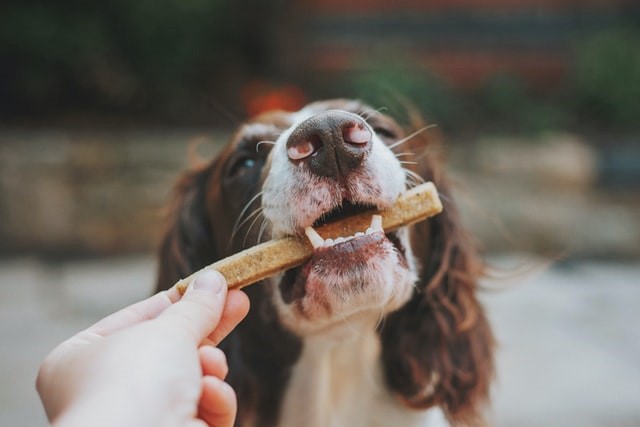How Long Does It Take a Dog to Digest Food?
Dogs can be pretty simple to feed. Though some people do go out of their way to prepare nutritious and varied meals for their dogs, most just put a bowl of nutrient-rich kibble in front of them a couple of times a day and just let their dog chow down.
As long as your dog is eating the food that you have picked out for them and otherwise seems healthy, then chances are you are not thinking too much about other food-related questions regarding your dog, such as how they are digesting that food. kepez escort bayan
It may surprise you to know then that when it comes to the health of your dog, knowing about your dog’s digestion is just as important as knowing and providing the nutrients it needs.
If you do not know how to tell when your dog’s digestive system is working properly, you will be unable to tell when it is working improperly, which can be an important indicator of potential health and digestive issues.
To help you out, we will be answering some of the questions you may have about your dog’s digestion, including how does a dog’s digestive system work? What factors go into your dog’s digestion? And of course, how long does it take for a dog to digest food?
What Is Digestion?
First things first: what is digestion?
Digestion is basically the process that allows the nutrients from food to be absorbed into our dogs’ bodies. We would not be able to use the nutrients we get from food without this process, and these nutrients are essential in keeping our and our dogs’ bodies working properly, even at a basic cellular level.
It is important to note here that digestion refers to the entire food intake process to waste output, not just how long it takes for food to be emptied out of the dog’s stomach. Therefore, just because your dog’s stomach is empty does not mean that they have already digested all of their last meal.
How Does a Dog Digest Their Food?

If you are familiar with how a human digestive system works, you probably have a pretty good idea of how the digestion process works in dogs. However, there are some key differences, like in terms of ingestion storage.
For example, humans tend to keep about 70% of their ingesta in their intestinal tract and 30% in their stomachs, while dogs have the opposite – 30% is in their intestinal tract, and 70% is in their stomachs.
If you would like even more detail, here is a breakdown of the canine digestive system.
Mouth
Just like in humans, the dog digestion process begins with the chewing of food in the dog’s mouth. Then, the teeth help rip apart the food into smaller pieces, and the enzymes in their saliva help break down that food even further.
Dogs do not need to chew their food as much as humans do because of all the extra saliva they produce that helps to break down their food. No wonder some dogs are so slobbery after eating!
Esophagus
After the food is swallowed, it travels down the esophagus and into the stomach.
Stomach
Once in the stomach, digestive enzymes and acids break down the food even more before it continues to move toward the intestines. The highly acidic nature of a dog’s stomach, especially when compared to humans, is why they can digest raw meat, other meat protein, and bones.
Here, the food is made into chyme, a substance that is a mix of stomach acids, food, and water, before it moves into the small intestine.
The Intestines
The chyme first moves into the small intestines from the stomach, which is where your dog absorbs most of the nutrients from the food. The liver via the gallbladder adds bile to the chyme here, both to help bind it and neutralize acids from the stomach, while the pancreas sends enzymes to help speed up the processes of digestion and absorption.
The nutrients now leave through the intestine walls and move into the blood to be used throughout the body. Finally, the nutrients are metabolized through the liver.
serik escort bayan
By the time the food reaches the large intestines, nearly all the nutrients have already been absorbed and distributed throughout your dog’s body. Everything that can no longer be used by the body or cannot be broken down any further makes its way through the large intestine.
Next, the large intestine absorbs any last water it can out of what is left. Then, the remaining waste moves into the rectum.
Colon
The colon stores this waste until the dog gets the urge to eliminate it. Finally, the waste exits the body through the anal canal.
You may have wondered why dogs generally seem to produce so much more waste than humans do at this stage. This is often because the physical volume of most dog food is much larger than the actual nutrients it contains that can be used and absorbed by the body. So, essentially, there is a lot of filler in most dog food.
How Long Does It Take a Dog to Digest Food?

Generally, it takes 6-8 hours for a dog to fully digest their food. But this number varies greatly and can be considerably higher or lower in many dogs. The amount of time it takes for a dog to digest food can depend on several factors.
Size
The size of your dog can certainly impact how long it takes to digest its food. For example, larger dogs typically have longer digestive processes than smaller ones.
Breed
Genetic factors can affect how long it takes for a dog to digest food. It is important to know factors such as what weights are typical for your breed of dog to aid in their digestive health.
Age
Like humans, younger pups tend to take less time to digest and eliminate their food than older dogs. This is partly because our metabolisms begin to slow down as we age.
Exercise
Again, just like us, exercise level affects a dog’s digestive system. The more exercise a dog gets, the quicker their bodies will use up any nutrients and energy available, which speeds up the digestive process.
On the other hand, if your dog eats a lot and lives more of a sedentary lifestyle, its digestion system may not work as efficiently. It is important to get the proper balance of caloric intake to the output of energy for your dog’s digestive health. ardahan escort bayan
Hydration
Dogs who drink a lot of water will likely have a speedier digestive process than less-hydrated dogs. This is because the extra water helps soften the dog’s stool and move things along in the system.
Wet vs Dry Food
Considering that well-hydrated dogs tend to have quicker digestion than those that are not, it may not surprise you to learn that wet dog food digests faster than dry food. In fact, a dog may be able to digest a can of wet dog food in about four hours, while the same quantity of dry food can take up to 8 hours.
Digestibility
Digestibility refers to the amount of nutrients a dog can absorb from its food. Food with high digestibility means your dog will be able to get more nutrients from a certain volume of food, while low digestibility means your dog will absorb fewer nutrients from that same volume.
The digestibility of dog food can be ranked like this:
- If it has less than 75% digestibility, it has a lower digestibility
- If it is between 75% and 82%, it has moderate digestibility
- If it is above 82%, it has high digestibility
If your dog is eating food with high digestibility, it will likely take less time for them to fully digest their food. This is because a dog digestive system will not have to work as hard to extract and absorb the nutrients it needs to ensure good overall health.
Medical Conditions
If your dog has a medical condition that affects their digestive system, this too will affect how long it takes them to digest food. Many different problems could affect their digestion, including liver and gallbladder disease, foreign bodies, tumors, parasites, and gastroenteritis.
There are many more issues that can affect the digestive system as well, so be sure to check with your vet if your dog has an existing medical condition.
Final Thoughts
By now, you should have a better idea of what a dog’s digestive system does and how different factors can affect how it functions and this can help you answer the question: how long does it take a dog to digest food?
Unfortunately, we cannot give you a straight answer as to how long it a dog to digest food because, as you have seen, many things can come into play here! But hopefully, you now have a better understanding of what to expect from the normal digestion process of YOUR dog and can use this knowledge to keep them at their healthiest and happiest. artvin escort bayan

